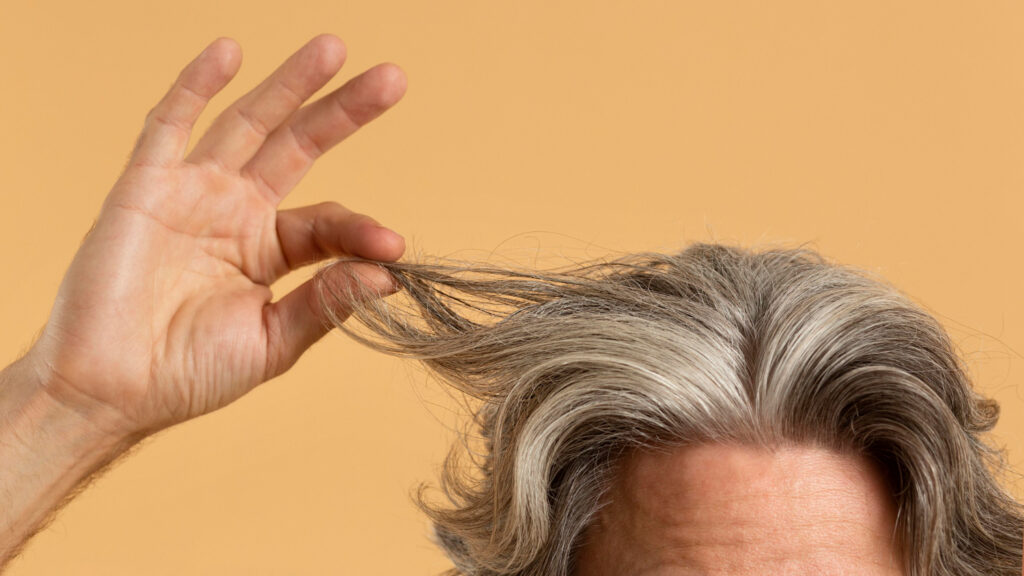
In this article
Silvery strands of hair are a prominent sign of aging, but getting gray hair doesn’t necessarily indicate that you’re closer to the end of your life span than your peers. Early gray hair might simply mean that your genetics are coming into play. While people gray at different rates naturally, other factors can also contribute to graying, such as stress.
Here’s an in-depth look at how and why hair turns gray, and what you can do if you want to potentially reverse it.
What Causes Gray Hair
Gray hair is primarily a result of melanin reduction. Melanin is the pigment that gives hair, skin, and eyes their color. It’s also responsible for freckles.
Scientists believe that stem cells, which mature into melanin-producing cells, may deteriorate, become damaged, or lose the necessary support systems to function. Various factors can cause hair to lose its color, including:
- Age
- Body Distribution
- Climate
- Chemical Exposure
- Genetic Defects
- Hormones
- Pollutants
- Toxins
White Hair vs. Gray Hair
The cells responsible for melanin production are called melanocytes. These melanocytes are located in the hair follicle, where each hair strand grows. Over time, these cells produce less melanin and eventually cease production altogether. The reduction or absence of melanin results in gray or white hair, respectively.
What Causes Premature Graying
If you’re noticing gray hair earlier than expected, there are several potential reasons. Premature graying can be influenced by ethnicity, lifestyle, and environmental factors.
Your age and ethnicity play a significant role in determining premature graying:
- Whites: Before age 20
- Asians: Before age 25
- Blacks: Before age 30
Lifestyle factors such as smoking can also lead to earlier graying. The longer you smoke, the higher your risk of premature graying.
Environmental influences like ultraviolet (UV) rays and air pollutants may contribute to premature graying. Stress is another significant factor, as it can generate “free radicals”—harmful chemicals from stress, smoking, inflammation, or radiation exposure—that may damage pigment-producing melanocyte stem cells.
A study in June 2021 by Columbia University Vagelos College of Physicians and Surgeons found evidence linking psychological stress to graying hair.
In rare instances, premature graying can indicate a medical condition, such as vitiligo (a disorder causing skin depigmentation), pernicious anemia (a condition where the body struggles to absorb vitamin B12), or issues with the pituitary or thyroid glands.
Genetic Causes
Certain genetic disorders can also cause premature graying:
- Albinism: A group of genetic conditions causing light-to-white skin, hair, and eyes due to a lack of melanin.
- Chédiak-Higashi Syndrome: A rare immune disorder resulting in fair skin and light hair with a metallic appearance.
- Griscelli Syndrome: A rare condition manifesting in infancy, featuring light skin and various abnormalities.
- Waardenburg Syndrome: Characterized by a white patch of hair above the forehead and lack of skin pigmentation.
Consult your healthcare provider if you have concerns about premature graying.
Can It Be Reversed?
Worrying about gray hair can induce stress, potentially accelerating graying and even causing hair loss. If you’re just beginning to see gray hairs, there’s some good news: Research indicates that once stress is reduced, your hair might return to its original color, though this is usually temporary.
For those who’ve been gray for a while, it’s less likely that reducing stress will revert your hair to its former color. Graying is a natural part of aging, and eventually, it becomes irreversible. However, managing stress can still offer numerous other health benefits.
Maintaining a balanced lifestyle, avoiding smoking, and minimizing exposure to environmental pollutants can help manage premature graying. While you can’t entirely prevent gray hair, these steps can potentially slow the process and contribute to overall well-being.
A Quick Review
Premature gray hair can be attributed to various factors including genetics, lifestyle, and environmental influences. Melanin reduction is the primary cause, with smoking and stress being significant contributors. Ethnicity also plays a role, determining the age at which graying begins. Understanding these causes can help manage and potentially slow the graying process.











